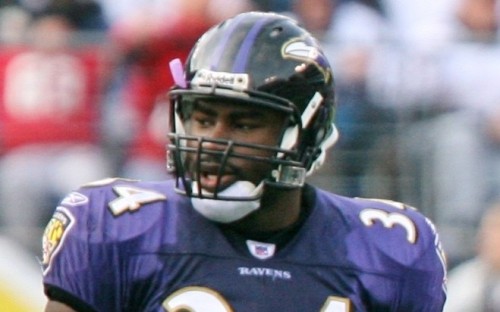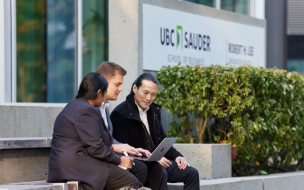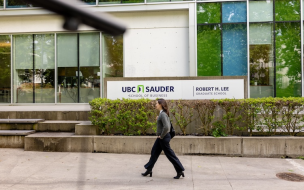Over 9 years and 107 games in the NFL, for the Falcons and the Baltimore Ravens beforehand, the Pro Bowl fullback became known as one of the game’s hardest hitters. Then, he got injured, replaced by a younger man and pushed out of the sport that he loves.
Yet while many NFL players struggle with life after football, Ovie has barely looked back. He’s founder and CEO of the Ovie Mughelli Foundation, which uses sports to educate young people in underprivileged communities about the environment.
And since graduating with an MBA from the George Washington University School of Business, he’s positioned himself as a leader in the green space, giving speeches at the White House and working with government and Fortune 500 companies to promote sustainability and corporate social responsibility (CSR).
Ovie is also involved in football punditry, hosting TV and radio shows for Fox Sports and CBS Radio.
And in his latest business venture, he works alongside former Ravens team-mate Ray Lewis as a brand partner for Nerium International, a skincare company whose products can help to reverse the effects of concussions. When it comes to his post-NFL career, he credits all he’s achieved to his MBA.
Why did you decide to get involved with promoting sustainability and the environment?
My youngest children were born severely premature and I had to watch them grow in an incubator for 2 months. The doctor told me that the air quality in Atlanta was at a place where my kids’ lungs couldn’t deal with it; they couldn’t safely come outside.
It hit me that the environment is about taking care of the next generation. And that if you really care about your kids, you’ve got to care about the environment.
How did the idea to start up your own foundation come about?
While not everyone cares about the environment, almost everyone loves sports.
I use sports as a catalyst, and we do everything from green football camps to events with different environmental speakers. I want kids to stop having to deal with the dangerous effects of the environment, and to be part of the solution.
Ovie educating kids through sports about the environment - © omfgreen.org
How big a challenge was it moving on into life after football?
It was difficult. I didn’t want to stop playing football. I thought I had 2 or 3 more years left in me. But I got injured, and my team thought they could find someone to do what I did for a better, cheaper rate.
Then, I realized that I’m one of the lucky ones. I had one of the most violent positions in football. From the NFL, to college, to high school football, I had over a hundred concussions, easily. The fact that I can still walk and talk is a blessing.
Now, I’m doing things that have never been done before. There’s never been an NFL player with an environmental foundation; who’s been to the White House and spoken on sustainability, who’s worked with the EPA (Environmental Protection Agency) and who’s done events with Al Gore. As amazing as it was, football is not the end all be all; it doesn’t define me.
What do you miss the most about playing professional football?
The camaraderie. There wasn’t a day playing football that I didn’t laugh at least a dozen times.
And the range of emotions that you had; the laughing, crying, sweating, bleeding, fighting with each other. There’s nothing like being on a team where everyone is so focused on a common goal.
And what don’t you miss?
The pain! Playing in the NFL, you get used to pain. But unless you’re some weird sadomasochistic person, no one enjoys pain.
My whole body hurt every single day. And I was taking all types of pain killers and body rubs to try and dull my senses. After football, waking up and not feeling every muscle, tendon and ligament in my body ache, was a beautiful thing!
Ovie partnering with the EPA - © omfgreen.org
Why did you decide to pursue an MBA at GWSB?
I was trained at a very young age to always want more, do more and be more. If I’m in the weight room and pushing 300 pounds on the bench press, I want to do 310 pounds the next day. If I’m running a 4 yard dash in 4.8 seconds, I want to do it in 4.7 seconds. That mentality led me to do an MBA.
And I was excited to do more than just football. I knew an MBA would give me more opportunities to do the things that I wanted to do.
GWU is one of the top universities in the US and getting a degree from there definitely means something. The history of the business school and the caliber of people who've come to GWSB and what they’ve done since leaving, really made an impression on me.
How have you profited from your MBA experience?
I have a lot of money. My salary from the NFL is public knowledge. So people always want to pitch me with business ideas, events and projects.
Before my MBA, I used to be a lot more gullible. Now, after two years of macro and micro economics and real-life business case studies, I have an intuitive ability to stay away from bad investments.
The positioning of myself and my brand in the smartest business way possible; all that goes to what I learnt as an MBA student.
What are your plans for the future?
I’m excited about what I’m doing as an environmental consultant and sustainability spokesperson. I’m already working with the city of Atlanta. We have Super Bowl coming in 2019, and that’s going to be beyond epic.
It’s a huge a chance to show the world what the NFL is doing to curb climate change, and to make sure everyone knows this is something we have to address and take care of, not tomorrow, but now.
RECAPTHA :
be
43
4e
6e










